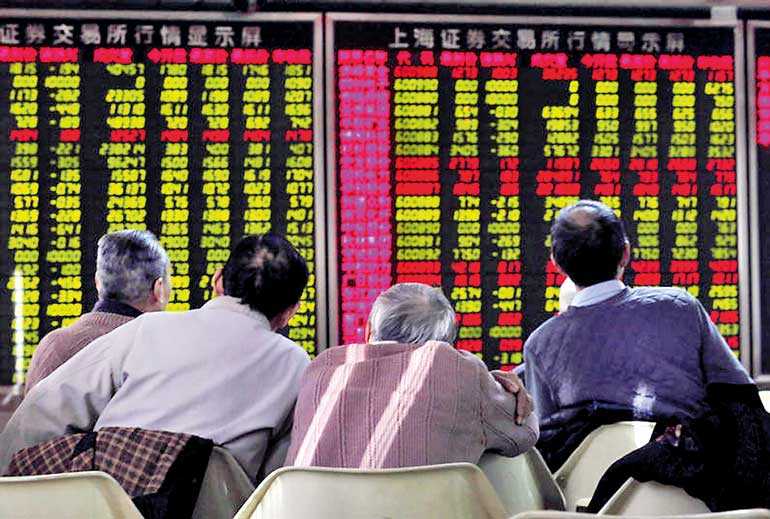Friday Feb 27, 2026
Friday Feb 27, 2026
Tuesday, 7 August 2018 00:00 - - {{hitsCtrl.values.hits}}

SYDNEY (Reuters): Asian shares pared gains on Monday as Chinese stocks swung into negative territory, driven lower by the escalating Sino-US trade war, though Beijing’s efforts to stop sharp declines in the yuan helped support the currency.
MSCI’s broadest index of Asia-Pacific shares outside Japan climbed 0.5%, having risen about 1% earlier in the day.
Chinese shares turned negative with the blue-chip share index and Shanghai’s SSE Composite down 0.7% each. Japan’s Nikkei was flat, while Australian shares added 0.5% and Hong Kong’s Hang Seng index gained 0.7%.
The trade dispute remains a live issue for markets with China proposing tariffs on $ 60 billion worth of US goods on Friday, while a senior Chinese diplomat cast doubt on prospects of talks with Washington to resolve the bitter trade conflict.
That was followed by a report in China’s State media saying Friday’s retaliatory tariffs were “rational”, while accusing the United States of blackmail.
At the same time, US President Donald Trump said his strategy of placing steep tariffs on Chinese imports is “working far better than anyone ever anticipated”, citing losses in China’s stock market. He predicted the US market could “go up dramatically” once trade deals were renegotiated.
“The drip feed of escalating tariff threats from Trump and counter threats from China continues,” said AMP Capital Chief Economist Shane Oliver.
“With a 25% tariff on (some) Chinese imports likely to commence soon, Trump is clearly ramping up the pressure on China, but China is digging in,” Oliver added.
“A tariff of this magnitude will start to have a significant economic impact on China’s growth, potentially knocking up to 0.5% off growth, and probably also on the US.”
At the same time, China is stepping up measures to support its currency, which has been hit by the worsening trade skirmish.
Late on Friday, the People’s Bank of China raised the reserve requirement on some foreign exchange forward positions, making it more expensive to bet against the Chinese currency and helping pull the yuan away from 14-month lows.
The move boosted the Australian dollar, which is often played as a liquid proxy for the yuan. The Aussie came off two-week lows to climb as high as $ 0.7412 after the announcement, and was last at $ 0.7389.
“Leaning against bearish CNY sentiment is important because a rapidly weakening currency risks triggering residential outflows and destabilising domestic asset prices,” JPMorgan analysts said in a note.
“Our economists think that PBOC likely will take further action if CNY depreciation continues or capital outflow pressure increases.”
Wall Street indices gained on Friday with the Dow adding 0.54%, the S&P 500 0.46% and the Nasdaq Composite 0.12%. They were helped by strong corporate earnings, although gains were capped by worries over the escalating trade tensions.
According to Bespoke Investment Group, mentions of tariffs in S&P 500 company earnings reports for the second quarter have more than doubled from the first quarter of this year.
Other factors too are weighing over investor sentiment.
“While the possibility of a trade war is still top of mind for investors, it isn’t the only cause for concern,” said Charles Schwab Australia Senior Investment Consultant Lachlan McPherson.
“Investors are also closely watching the rising value of the US dollar, slowing global economic growth and the risk of the Federal Reserve tightening short-term interest rates too quickly and dampening domestic economic growth.”
The dollar index, which measures the greenback against a basket of six other currencies, has risen 3.4% so far this year with strong rallies since April when Trump first announced the tariffs. The index was last up 0.15% at 95.29.
Traders see further upside in the dollar as they maintained a significantly large long position on the currency, while net short bets on the Aussie were their largest since November 2015.
The British pound hovered near 11-day lows at $ 1.299 following remarks by Bank of England Governor Mark Carney that Britain faced an “uncomfortably high” risk of a “no deal” Brexit.The euro inched down to more than 5-week lows of $ 1.155.
Gold bounced from near 17-month lows after weaker-than-expected US jobs data, and was last up 0.2% at $ 1,215.45.
Meanwhile, Brent crude futures rose 22 cents to $ 73.43, while US crude oil futures added 28 cents to $ 68.77 a barrel.